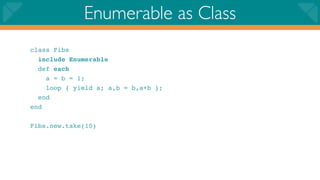This document provides an overview of functional programming concepts in Ruby. It discusses the history and advantages of functional programming, comparing the functional and object-oriented paradigms. It introduces functional programming concepts like pure functions, recursion, immutable data, and higher-order functions. It demonstrates how these concepts can be applied in Ruby using functions, closures, currying, composition, and the Enumerable module. Overall, the document serves as a high-level introduction to thinking functionally in Ruby.
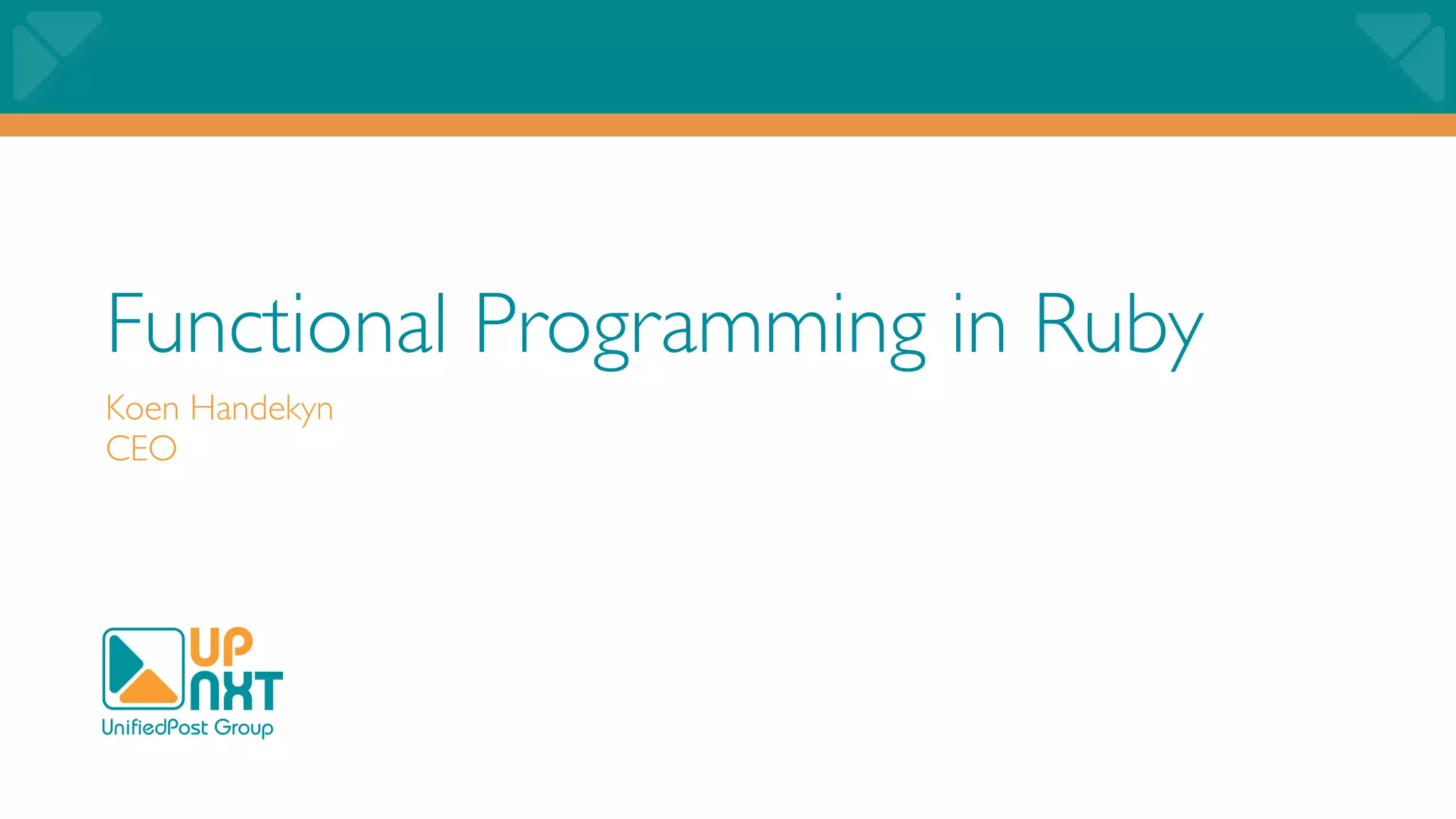
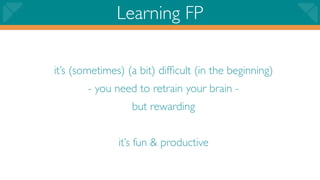
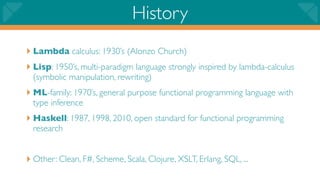
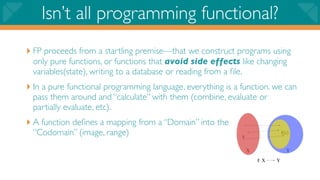
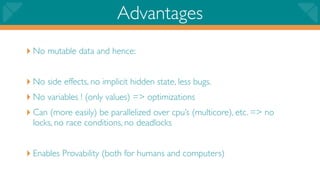
![FP vs OO
‣ Whereas an object-oriented mindset will foster the approach of
defining an application domain as a set of nouns (classes) [ person, ticket,
etc ]
‣ The functional mind will see the solution as the composition or verbs
(functions) [ register, sell ]
‣ Though both programmers may in all likelihood generate equivalent results, the
functional solution will be more succinct, understandable, and reusable. Grand
claims indeed!](https://image.slidesharecdn.com/functionalprogramminginruby-130221160913-phpapp01/85/Functional-programming-in-ruby-6-320.jpg)
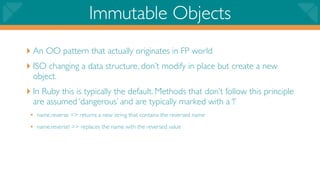
![Ruby and FP
‣ Ruby is an imperative and OO language with closure support
‣ But we can apply (some) FP principles
‣ It allows to mix and match OO with FP programming style
A bit of pattern matching
‣ You can’t assume immutability ... it’s a choice • x, *xs = [1,2,3,4]
‣ No (real) pattern matching (yet) x => 1
xs => [2,3,4]
‣ No lazy evaluation (yet) • a,b,tail = [1,2,3,4]
a => 1
b => 2
tail => [3,4]](https://image.slidesharecdn.com/functionalprogramminginruby-130221160913-phpapp01/85/Functional-programming-in-ruby-8-320.jpg)
![Recursion
# fibonacci functional through recursion
def fib(count, a = 1, b = 1 , r = []) r is the
accumulator
count == 0 ? r : fib(count-1, b, a+b, r << a)
end
fib(10) # => [1,1,2,3,5,... needs a bit of
practice but
once you get
it ...](https://image.slidesharecdn.com/functionalprogramminginruby-130221160913-phpapp01/85/Functional-programming-in-ruby-9-320.jpg)
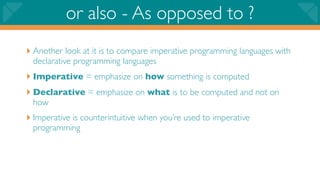
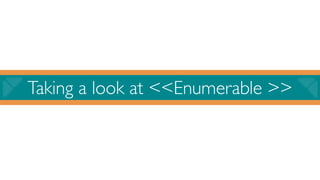
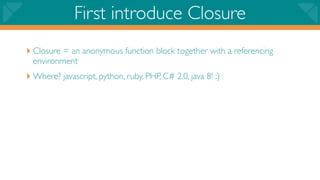
![Enumerable#select
(1..10).select { |x| x.odd? }
=> [1, 3, 5, 7, 9]
# imperative style
odds = []
(1..10).each do |n|
odds << n if n.odd?
end](https://image.slidesharecdn.com/functionalprogramminginruby-130221160913-phpapp01/85/Functional-programming-in-ruby-13-320.jpg)
![Enumerable#partition
(1..10).partition { |x| x.odd? }
=> [[1, 3, 5, 7, 9], [2, 4, 6, 8, 10]]
# imperative style
p = [[],[]]
(1..10).each do |n|
p[0] << n if n.odd?
p[1] << n unless n.odd?
end](https://image.slidesharecdn.com/functionalprogramminginruby-130221160913-phpapp01/85/Functional-programming-in-ruby-14-320.jpg)
![Enumerable#map
(1..10).map { |x| x * 2 }
=> [2, 4, 6, 8, 10, 12, 14, 16, 18, 20]
# imperative style
doubles = []
(1..10).each do |n|
doubles << n*2
end](https://image.slidesharecdn.com/functionalprogramminginruby-130221160913-phpapp01/85/Functional-programming-in-ruby-15-320.jpg)
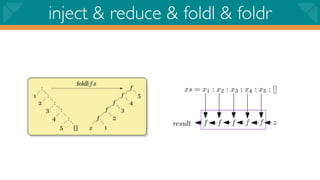
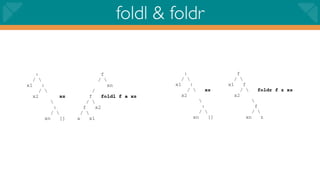
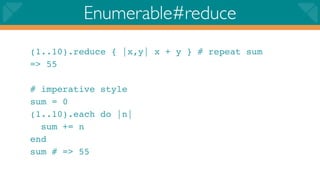
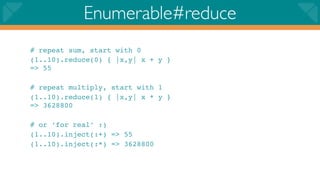
![Enumerator#group_by
(1..6).group_by { |i| i%3 }
=> {0=>[3, 6], 1=>[1, 4], 2=>[2, 5]}
# imperative style
p = {}
(1..6).each do |n|
k = n%3
p[k] ||= []
p[k] << n
end](https://image.slidesharecdn.com/functionalprogramminginruby-130221160913-phpapp01/85/Functional-programming-in-ruby-20-320.jpg)
![Enumerable#sort
%w(rhea kea flea).sort
#=> ["flea", "kea", "rhea"]
(1..10).sort {|a,b| b <=> a}
#=> [10, 9, 8, 7, 6, 5, 4, 3, 2, 1]
# imperative style
# ... have fun ...](https://image.slidesharecdn.com/functionalprogramminginruby-130221160913-phpapp01/85/Functional-programming-in-ruby-21-320.jpg)

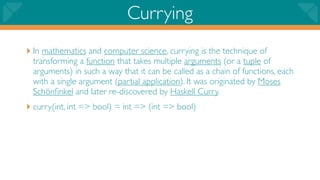
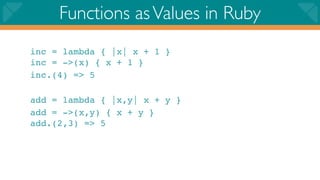
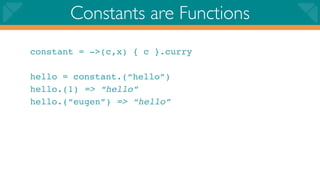
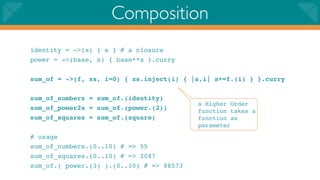
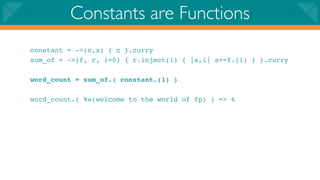
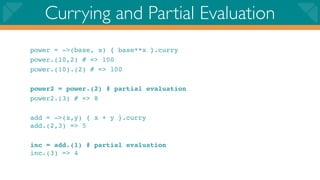
![Currying and Partial Evaluation
# meta functional programming ;)
send = ->(m, o) { o.send(m) }.curry
length_of = send.(:length)
length_of.(“koen”) # => 4
length_of.([12,4,25,32,[2,2]]) # => 5](https://image.slidesharecdn.com/functionalprogramminginruby-130221160913-phpapp01/85/Functional-programming-in-ruby-29-320.jpg)
![More Composition
# from previous
length_of = ->(o) { o.length }
sum_of = ->(f, r, i=0) { r.inject(i) { |a,i| a+=f.(i) } }.curry
# compose
total_length_off = sum_of.(length_of)
# use
total_length_off.( ['koen','ciprian','eugen'] ) # => 16
total_length_off.( [ [2,3,4], "koen", [3,4,5] ] ) # => 10](https://image.slidesharecdn.com/functionalprogramminginruby-130221160913-phpapp01/85/Functional-programming-in-ruby-30-320.jpg)
![Playing with boxes
box1 = { width: 230, heigth: 304 }
box2 = { width: 340, heigth: 243 }
by_key = ->(k, o) { o[k] }.curry
by_width = by_key.(:width)
taller = ->(f, a, b) { f.(a) > f.(b) }.curry
taller.(by_width, box1, box2) # => false
taller.(by_key.(:heigth)).(box1,box2) # => true](https://image.slidesharecdn.com/functionalprogramminginruby-130221160913-phpapp01/85/Functional-programming-in-ruby-31-320.jpg)
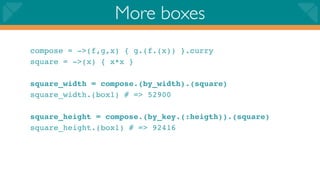
![More composition
map = ->(f, a) { a.map { |x| f.(x) }}.curry # turn method into lambda
squares = ->(a) { map.(square).(a) }
squares = map.(square) # nicer through composition, not ? :)
sum = ->(a) { a.inject(0,:+) }
square_of_sum = compose.(sum).(square)
after = compose
sum_of_squares = after.(squares).(sum)
square_of_sum.([2,3]) # => 25
sum_of_squares.([2,3]) # => 13
square_of_sum.([2,3,4]) # => 81
sum_of_squares.([2,3,4]) # => 29](https://image.slidesharecdn.com/functionalprogramminginruby-130221160913-phpapp01/85/Functional-programming-in-ruby-33-320.jpg)
![More composition
book = [ %w(this is a long sentence), %w(this is a short), %w(yes) ]
foldl = ->(f, arr) { arr.inject { |r, x| f.(r, x) } }.curry
add = ->(a,b) { a+b }
div = ->(a,b) { a*1.0/b }
length = ->(x) { x.length }
sum = foldl.(add)
divide = foldl.(div)
pair = parallel = ->(f,g,x) { [f.(x), g.(x) ] }.curry
average = ->(a) { sum.(a) / length.(a) }
average = after.( pair.(sum).(length) ).(divide)
average_wordcount = after.( map.(length) ).(average) # => 3.33](https://image.slidesharecdn.com/functionalprogramminginruby-130221160913-phpapp01/85/Functional-programming-in-ruby-34-320.jpg)
![More Composition
book = [
%w(this is a long sentence),
%w(this is a short),
%w(yes) ]
flatten = ->(arr) { arr.flatten } # convert to lambda
wordlengths = after.( flatten ).( map.(length) )
average_wordlength = after.(wordlengths).(average)
average_wordlength.(book) # => 3.4](https://image.slidesharecdn.com/functionalprogramminginruby-130221160913-phpapp01/85/Functional-programming-in-ruby-35-320.jpg)
![Liquer Stores
liquer_stores = []
liquer_stores << { name: "total", d: 2.0, price: 32.0 }
liquer_stores << { name: "shell", d: 2.6, price: 28.5 }
liquer_stores << { name: "esso", d: 3.2, price: 41.0 }
liquer_stores << { name: "q8", d: 3.5, price: 22.0 }
liquer_stores << { name: "shell", d: 4.5, price: 19.0 }
liquer_stores << { name: "q8", d: 5.5, price: 18.0 }](https://image.slidesharecdn.com/functionalprogramminginruby-130221160913-phpapp01/85/Functional-programming-in-ruby-36-320.jpg)
![Imperative Liquer
def cheap_boose_nearby (liquer_stores)
min = liquer_stores[0][:price]
liquer_stores.each do |store|
if store[:d] < 5.0 then
price = store[:price]
price = price * 0.9 if store[:name] == "shell"
min = price if price < min
end
end
min
end](https://image.slidesharecdn.com/functionalprogramminginruby-130221160913-phpapp01/85/Functional-programming-in-ruby-37-320.jpg)
![Declarative Liquer
def expensive_boose_nearby (liquer_stores)
nearby = ->(d, x) { x[:d] < d }.curry
near = nearby.(5.0)
myPrice = ->(x) {
x[:name] == "shell" ? x[:price]*0.9 : x[:price]
}
liquer_stores.
find_all(&near). recognize
collect(&myPrice). SQL ?
max
end](https://image.slidesharecdn.com/functionalprogramminginruby-130221160913-phpapp01/85/Functional-programming-in-ruby-38-320.jpg)
![Generators / Sequence / Infinite ...
# Functions that return a sequence of values
# Here: fibonacci as infinite yielder
fibonacci = Enumerator.new do |list|
a = b = 1
loop { list.yield a; a,b = b,a+b }
end
fibonacci.take(10) # [1, .. , 55]
fibonacci.take(15) # [1, .. , 377, 610]](https://image.slidesharecdn.com/functionalprogramminginruby-130221160913-phpapp01/85/Functional-programming-in-ruby-39-320.jpg)
